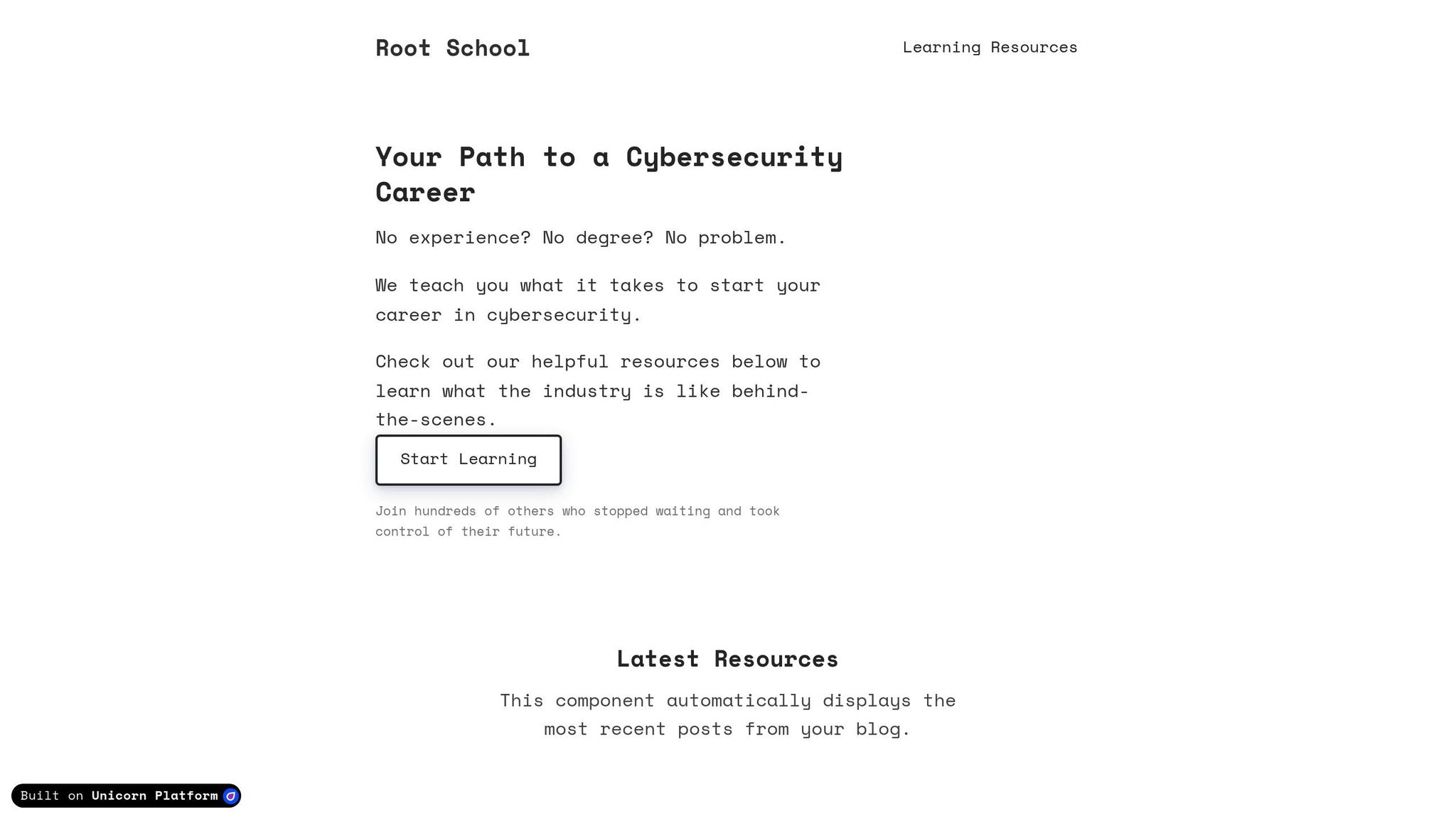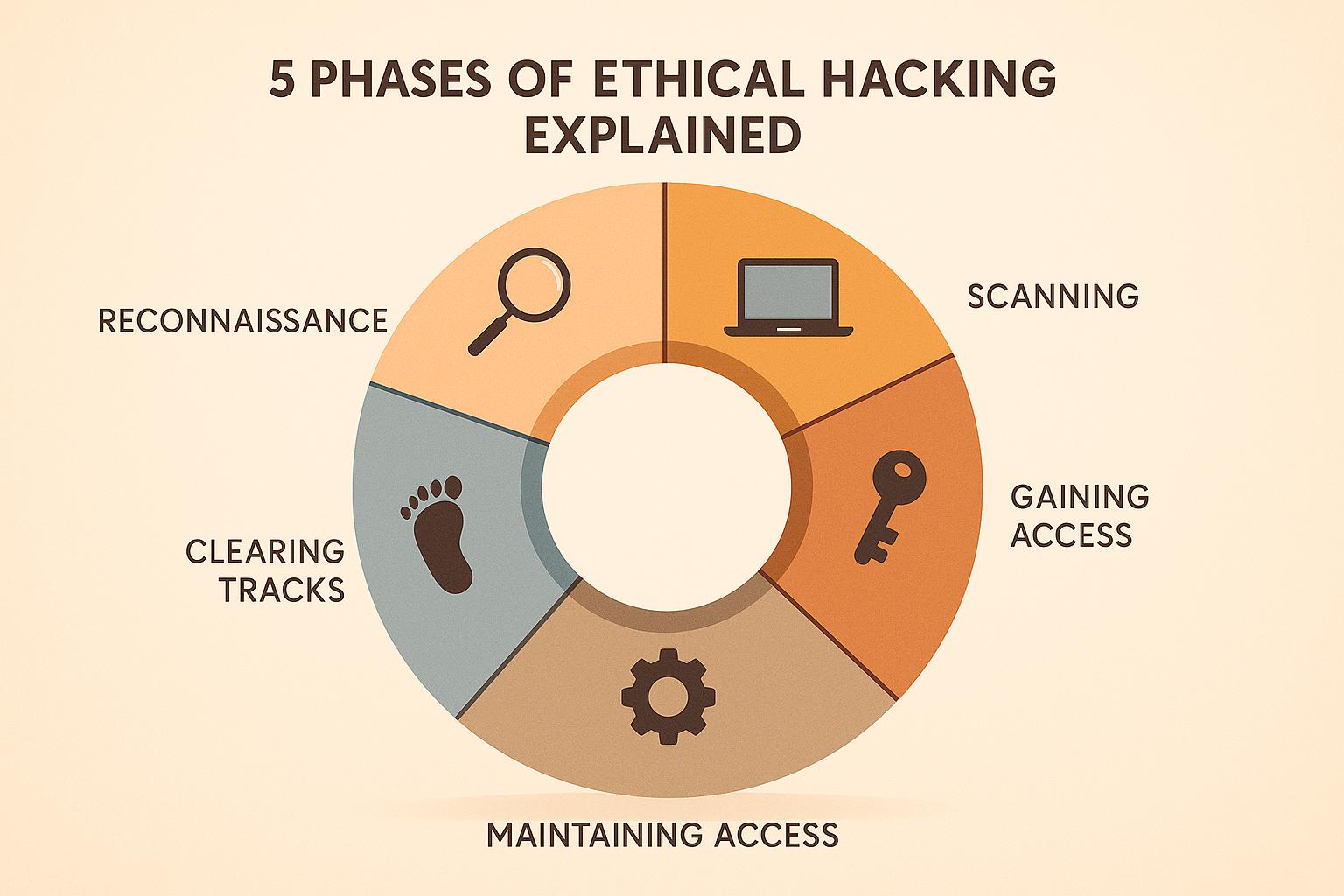Entry-level cybersecurity consultants help protect businesses from cyber threats by identifying vulnerabilities, analyzing risks, and supporting incident responses. They work with tools like Nessus, Splunk, and CrowdStrike to scan systems, monitor activity, and assist in audits. Key responsibilities include:
- Running vulnerability scans and testing systems for weaknesses.
- Monitoring networks for suspicious activity.
- Supporting compliance audits (e.g., HIPAA, PCI DSS).
- Assisting with incident response by gathering evidence and containing threats.
- Writing reports that translate technical findings for non-technical stakeholders.
Where They Work: These roles exist in consulting firms, corporations (finance, healthcare, tech), and government agencies. Job titles may include Junior Security Analyst, SOC Analyst, or Cybersecurity Associate.
Skills Needed: Proficiency in network security, operating systems (Windows, Linux, macOS), compliance standards, and scripting (Python, PowerShell). Strong communication and teamwork skills are equally important.
Career Growth: Entry-level salaries range from $50,000–$85,000 depending on location and company size. Certifications like Security+ or CEH can boost prospects. Specializations in areas like penetration testing or incident response lead to higher-paying roles.
This career combines technical expertise with communication skills, offering a strong starting point for growth in cybersecurity.
5 Top Entry-level Cybersecurity Jobs🤑
Daily Tasks and Main Responsibilities
The everyday work of an entry-level cybersecurity consultant focuses on three main areas: identifying system vulnerabilities, supporting security evaluations, and assisting with responses to cyber incidents.
Finding System Vulnerabilities
A big part of the job involves running daily scans using tools like Nessus, Qualys, and OpenVAS. These scans help uncover vulnerabilities that might have been missed during earlier assessments - things like outdated software patches or security settings that attackers could exploit.
Beyond automated scans, consultants use tools such as Wireshark and Zeek to monitor network activity. They look for unusual patterns that could indicate active breaches or other security concerns.
Testing web applications is another key responsibility. Tools like Burp Suite and Acunetix are used to identify vulnerabilities such as SQL injection and cross-site scripting. Under the guidance of senior team members, entry-level consultants may also participate in penetration testing exercises, where they gather data, document findings, and pick up advanced techniques along the way.
The information gathered during these activities feeds directly into risk evaluations and security audits.
Helping with Risk Reviews and Security Audits
A significant part of the role involves compliance audits. Consultants review security policies, analyze system configurations, and document any gaps to ensure adherence to standards like HIPAA, PCI DSS, and SOX.
They also assess existing security measures by reviewing firewall rules, checking access permissions, and testing backup systems during simulated failures. These tasks are complemented by creating detailed reports that break down technical findings into clear, actionable insights for both technical teams and non-technical stakeholders.
By analyzing logs and reports, consultants contribute to risk assessments that guide key security decisions.
Once risks are identified and controls are evaluated, consultants must be ready to act quickly when incidents occur.
Responding to Security Incidents
When security incidents arise, entry-level consultants play a critical support role. They assist response teams by collecting evidence, documenting timelines, and helping to contain threats. Using SIEM platforms like Splunk and IBM QRadar, they monitor real-time alerts to identify which ones require immediate action. A key skill they develop is distinguishing false alarms from genuine threats.
They also work with endpoint detection and response (EDR) tools such as CrowdStrike Falcon and SentinelOne. These platforms help monitor individual devices for signs of compromise. If suspicious activity is detected, consultants investigate the alerts and coordinate with IT teams to isolate affected systems.
To make incident response more efficient, many entry-level consultants learn scripting languages like Python or PowerShell. Automating repetitive tasks, like data collection and preliminary analysis, not only saves time but also sharpens their technical expertise.
Required Skills and Knowledge
Starting out as a cybersecurity consultant requires a blend of technical know-how and strong interpersonal abilities. While expertise with security tools and frameworks is essential, being able to clearly communicate findings and collaborate within diverse teams is just as important.
Technical Skills You Need
A solid understanding of network security basics is crucial. This includes recognizing attack vectors and recommending suitable defenses. Knowing how firewalls, intrusion detection systems, and network segmentation function allows consultants to analyze network traffic and security logs effectively. Familiarity with TCP/IP protocols, routing, and switching is also key to this analysis.
Being proficient in Windows, Linux, and macOS is vital. These operating systems require consultants to manage user permissions, file systems, and security settings. Whether conducting vulnerability assessments or investigating incidents, this knowledge ensures thorough evaluations across platforms.
Understanding compliance standards like HIPAA, PCI DSS, and SOX is equally important. These frameworks outline specific security requirements, and consultants must identify compliance gaps and suggest fixes during audits.
Knowing how to use scripting languages like Python or PowerShell can make a big difference. Automating tasks such as log analysis and report generation saves valuable time, especially during incident response.
Finally, having expertise in configuration management, backup systems, and endpoint protection tools provides a more comprehensive view of an organization’s security setup.
While technical expertise is critical, the ability to communicate effectively is what often sets great consultants apart.
Communication and Teamwork Skills
Technical knowledge alone isn’t enough; consultants also need to excel in communication and collaboration to manage risks effectively.
One key skill is the ability to translate technical jargon into business terms. Non-technical stakeholders, including executives, need to understand security risks and recommendations in the context of their business. This means explaining vulnerabilities in terms of their potential impact on operations and finances.
Active listening is another essential skill. By understanding client concerns and organizational constraints, consultants can tailor their recommendations instead of offering generic solutions.
Strong writing skills are also necessary. Consultants spend a lot of time documenting their findings, creating reports, and drafting security policies. Reports should be clear and structured to help clients grasp current risks and prioritize fixes. They must balance technical accuracy for IT teams with accessibility for management.
When dealing with security incidents, collaborative problem-solving is vital. Consultants often work with IT staff, legal teams, and business leaders to manage threats and restore operations. Staying calm under pressure and coordinating effectively across teams can significantly improve incident outcomes.
Interpersonal skills are just as important as technical ones when it comes to delivering impactful security assessments.
Keeping Up with New Threats and Tools
The cybersecurity field changes constantly, with new attack methods and defensive tools appearing all the time. Staying updated isn’t optional - it’s a requirement for success.
Resources like the MITRE ATT&CK framework, CVE databases, and vendor advisories offer insights into emerging vulnerabilities and attack strategies. Consultants who keep up with these sources can identify risks before they become major issues for clients.
Professional development is another critical aspect. Certifications such as Security+ or CISSP, along with specialized vendor credentials, help consultants deepen their skills. Many organizations even support employees in pursuing these certifications.
Engaging with the community through conferences, meetups, and online forums also provides invaluable learning opportunities. Connecting with peers who face similar challenges can lead to better solutions and fresh perspectives on common problems.
sbb-itb-8a31326
Career Growth and Advancement
The field of cybersecurity consulting offers a world of opportunities for professional growth. Whether you're aiming to specialize in a particular area or boost your earning potential, understanding how to enter this field and chart your career path can make a big difference in achieving your goals.
How to Get Started
Breaking into cybersecurity consulting often begins with internships or entry-level roles like junior analyst positions. These roles provide hands-on experience with security tools and client interactions, and many internships transition into full-time positions.
Earning certifications is a critical step. CompTIA Security+ is great for building a foundation in network and operational security, while Certified Ethical Hacker (CEH) focuses on penetration testing skills. These certifications not only validate your knowledge but also make your resume stand out.
Diverse educational backgrounds are welcomed in this field. Employers value curiosity and a willingness to learn just as much as formal education.
Another popular entry point is through bootcamps and intensive training programs. These courses, often lasting 12–24 weeks, emphasize practical skills like incident response, vulnerability assessment, and using security tools. For career changers, programs like Root School offer structured learning paths tailored to help you land your first cybersecurity role.
Once you’ve built a strong foundation, you can begin to specialize, which opens the door to higher-level positions and increased earning potential.
Moving to Specialized Roles
Specialization is where consultants can truly advance their careers, taking on more complex challenges and earning higher salaries.
- Penetration Testing: After gaining 2–3 years of experience and earning certifications like OSCP or GPEN, penetration testers can expect to earn between $95,000 and $130,000 annually.
- Security Architecture: If designing security solutions appeals to you, this could be a great path. With 3–5 years of experience and certifications like CISSP or SABSA, security architects can earn between $110,000 and $150,000 per year.
- Compliance and Risk Analysis: This track focuses on business and regulatory frameworks like SOC 2, ISO 27001, or industry-specific standards. Senior compliance consultants often earn between $85,000 and $120,000 annually.
- Incident Response: Specializing in this area means handling forensic analysis, malware investigations, and crisis management during security breaches. While the work can involve irregular hours, it’s well-compensated, with annual salaries ranging from $100,000 to $140,000.
- Management and Leadership: After 5–7 years of consulting experience, roles like practice lead, engagement manager, or consulting director become accessible. These positions involve overseeing client relationships and mentoring junior staff, with salaries ranging from $130,000 to $200,000 annually.
Entry-Level Salary Ranges
Understanding salary expectations and regional variations can help you make informed career decisions. Salaries in cybersecurity consulting vary based on location, company size, and individual qualifications.
- Major Cities: In metropolitan hubs, starting salaries typically range from $70,000 to $85,000 annually. These roles often come with perks like signing bonuses, stock options, and comprehensive health benefits.
- Mid-Tier Markets: Cities like Atlanta, Denver, and Austin offer starting salaries between $60,000 and $75,000. These areas provide a balance of career opportunities, lower living costs, and better work-life balance.
- Smaller Markets and Remote Work: Entry-level salaries in smaller markets or remote positions generally fall between $50,000 and $65,000. Remote work has become increasingly common, allowing professionals to access higher-paying roles regardless of location.
The size of the consulting firm also plays a role in compensation. Large firms like Deloitte, PwC, and EY offer structured salary bands, clear advancement paths, and comprehensive benefits. Smaller boutique firms may provide more flexibility and faster career progression but might come with less job security.
Performance-based bonuses are another common feature, often adding 10–20% to base salaries for entry-level roles. These bonuses are typically tied to metrics like billable hours, client satisfaction, and individual performance.
Additionally, benefits packages significantly enhance overall compensation. Many firms offer health insurance, retirement matching, professional development budgets, and paid certification training.
The cybersecurity consulting field rewards continuous learning and specialization, with many professionals seeing noticeable salary increases within their first 3–5 years as they gain expertise and take on more complex client work.
Work Environment and Professional Growth
Cybersecurity consulting offers a flexible work setup and abundant opportunities for professional development. Knowing what to expect can help you hit the ground running and grow in your career.
Typical Work Setup and Management
Entry-level cybersecurity consultants often work in hybrid or fully remote environments. Since most security tasks can be handled from anywhere with a secure internet connection, many firms have embraced this flexibility.
In a typical consulting firm, you’ll report to a senior consultant or engagement manager who oversees your daily responsibilities and client interactions. This setup not only ensures quality control but also provides mentorship opportunities. You’ll likely juggle multiple projects, exposing you to a variety of industries and security challenges.
While your workweek usually aligns with standard business hours - about 40 hours per week - there may be times when incident responses or major security assessments require evening or weekend work. To balance this, firms often offer flexible time off or overtime pay.
Collaboration plays a big role in consulting. You’ll work closely with IT administrators, compliance officers, and even executive teams to align cybersecurity strategies with broader business goals. Tools like project management software help keep everything on track, especially during fast-moving incident responses. This structured, team-oriented environment naturally leads to ongoing learning and skill-building.
Training and Skill Development
Continuous learning is a key part of cybersecurity consulting. Many firms invest heavily in their employees’ professional development, often allocating thousands of dollars annually per person for training and certifications.
Employers typically cover the costs of certification exams, study materials, and even provide paid study time. Some of the most sought-after certifications include CISSP, CISM, and specialized credentials like GCIH for incident handling or GSEC for security fundamentals.
Beyond certifications, firms often offer hands-on training through internal labs, simulation environments, and exercises that mimic real-world cyberattacks. Mentorship programs pair you with seasoned professionals who can provide technical guidance and career advice.
You’ll also have chances to attend industry conferences like RSA Conference, Black Hat, or DEF CON. Internal knowledge-sharing sessions - ranging from lunch-and-learn events to technical workshops - help you stay informed about emerging threats and best practices. These learning opportunities are essential for building the practical skills needed in cybersecurity consulting.
Using Root School as a Learning Resource

For those stepping into cybersecurity consulting, Root School is a valuable resource that focuses on the practical skills consulting firms look for. It emphasizes areas like vulnerability assessments, security frameworks, and effective communication with clients.
The curriculum covers essential topics such as risk assessment, compliance standards, and incident response processes - skills you’ll use daily in consulting roles. Its hands-on approach mirrors the real-world scenarios you’ll encounter, making the learning experience highly relevant to client engagements.
Root School also offers career transition support, helping you bridge knowledge gaps and build the confidence needed for client-facing roles. It’s especially useful for learning how to explain technical concepts to non-technical stakeholders. Even after landing your first job, Root School can remain a helpful resource to keep your skills sharp in the fast-changing world of cybersecurity.
Conclusion
Entry-level cybersecurity consultants play a crucial role in safeguarding organizations by spotting vulnerabilities, assisting with risk evaluations, and tackling incidents in an ever-evolving threat environment.
These roles are more than just a starting point - they open doors to significant career growth. Contrary to popular belief, breaking into cybersecurity consulting isn’t as daunting as it seems. Many employers prioritize hands-on experience and beginner-level certifications, making this field accessible to recent grads and career switchers alike.
What sets these professionals apart is their ability to combine technical know-how with effective communication. They simplify complex security issues into actionable strategies, ensuring businesses not only understand the threats but also how to address them. This skillset is critical as cyberattacks grow more sophisticated, demanding both advanced solutions and organizational alignment.
Whether you’re drawn to deep technical challenges or thrive in client-facing roles, starting as an entry-level consultant equips you with the flexibility to tackle new threats and adapt to cutting-edge technologies.
Success in this field hinges on developing both technical expertise and strong communication skills. Companies rely on cybersecurity consultants to safeguard their most critical assets, making this career path both demanding and deeply fulfilling for those ready to rise to the challenge.
FAQs
What certifications can help you grow from an entry-level cybersecurity consultant role?
Certifications are a great way to boost your cybersecurity career. If you're just starting out, certifications like CompTIA Security+ can help you build a strong foundation in security principles. Another excellent option is the Certified Ethical Hacker (CEH), which dives into penetration testing and ethical hacking techniques.
As you gain more experience, advanced certifications can take your career to the next level. For example, the Certified Information Systems Security Professional (CISSP) and Certified Information Security Manager (CISM) are highly respected in the industry. These credentials highlight your ability to design and manage security programs, making you a strong candidate for senior-level positions.
How do entry-level cybersecurity consultants balance technical tasks with teamwork and communication?
Entry-level cybersecurity consultants juggle technical tasks with collaboration and clear communication. They actively engage in team projects and make sure their work is well-documented and straightforward, ensuring everyone involved can easily follow along. Regular updates and discussions with team members, managers, and stakeholders help keep goals aligned and progress transparent.
Interpersonal skills play a key role in this position. Being able to clearly explain complex technical ideas to non-technical audiences is essential. Strong verbal and written communication, problem-solving abilities, and flexibility help consultants build trust and encourage teamwork across different groups. These skills are as vital as technical knowledge when it comes to creating effective cybersecurity strategies.
What are the main differences in responsibilities and work environments for entry-level cybersecurity consultants at large firms versus smaller boutique firms?
The roles and work settings for entry-level cybersecurity consultants can differ greatly depending on whether you join a large corporation or a smaller boutique firm.
In larger firms, your responsibilities are usually more specialized. You might find yourself as part of a dedicated team focusing on specific areas like compliance, threat detection, or incident response. These organizations often have a formal work culture with clearly defined procedures and a structured hierarchy.
In contrast, smaller boutique firms tend to offer a broader range of experiences. As an entry-level consultant, you might juggle tasks such as conducting technical assessments and engaging directly with clients. These firms typically operate in a more flexible, less formal environment, which can accelerate hands-on learning and help you build a wide array of skills early in your career.
Each setting has its own benefits, so the right fit will depend on your career aspirations and the type of work atmosphere you thrive in.


